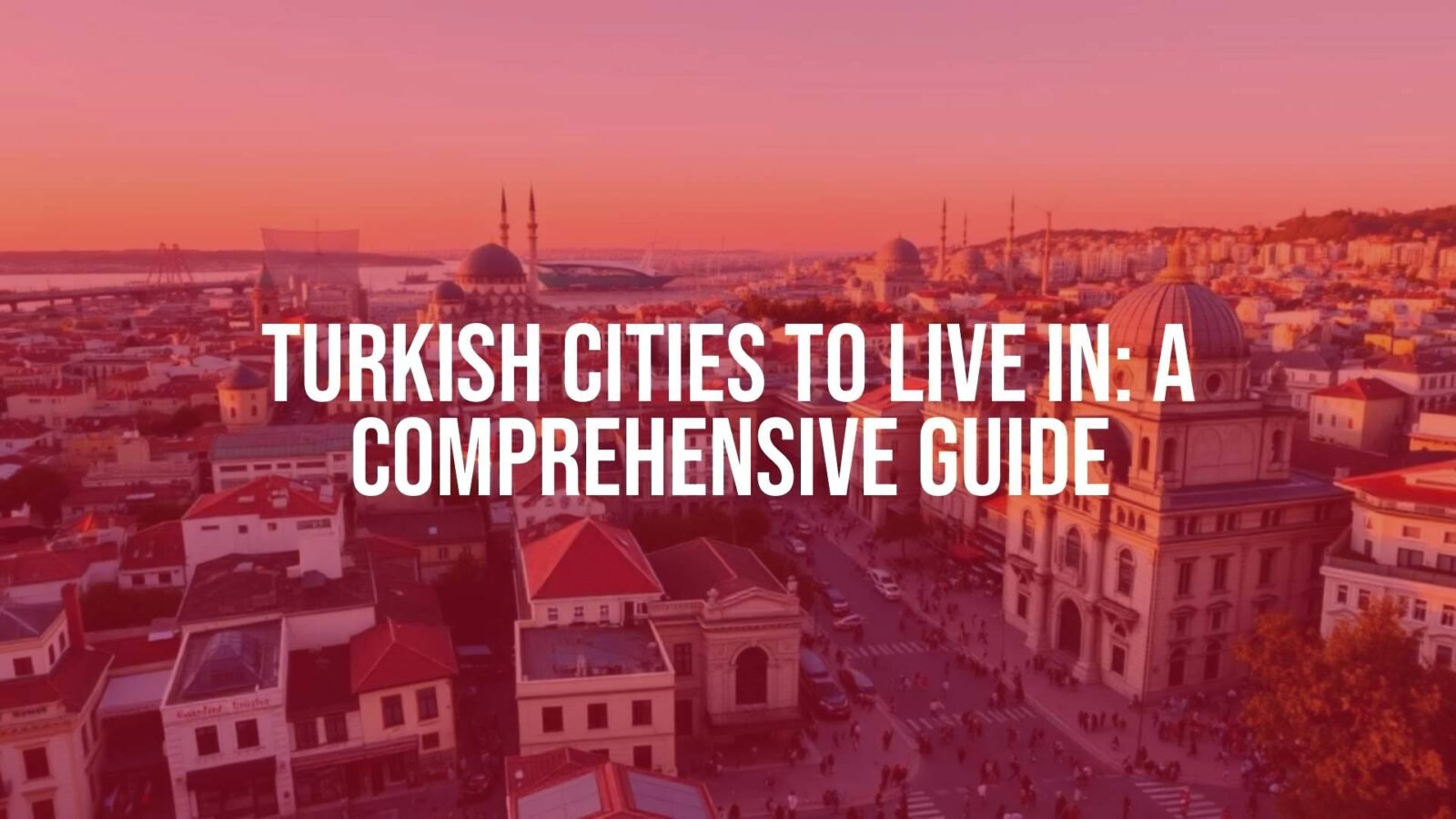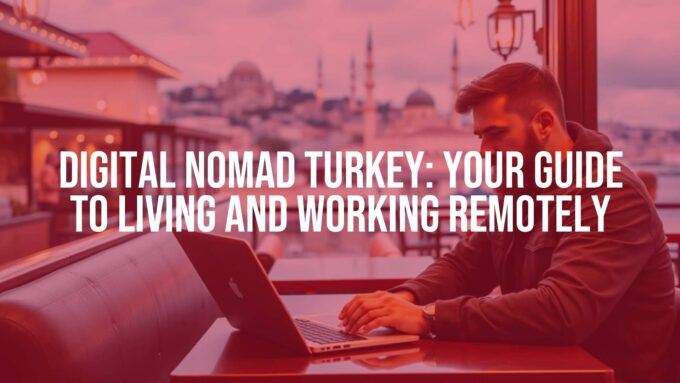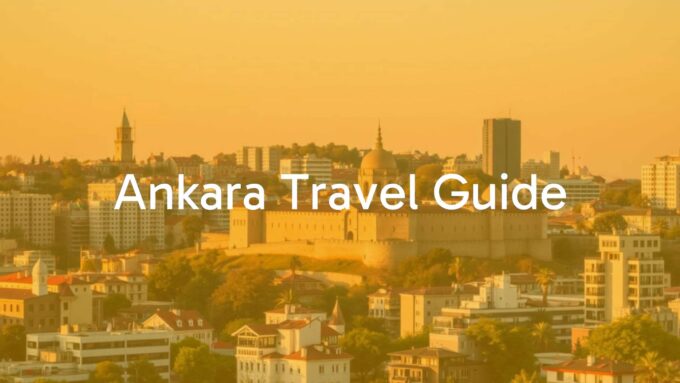Picking a place to live is a big choice. In Turkey, many lively options open up. You are not just finding a roof over your head, but a city that fits your lifestyle, budget, and plans. From the busy, historic streets of Istanbul to the calm, sunny shores of the Aegean and Mediterranean, Turkey offers many kinds of city life. Whether you want the buzz of a big city or the peace of a coastal town, this country — full of natural beauty, famous sights, and rich culture — has a city ready to welcome you.

Why Consider Living in Turkish Cities?
Turkey links continents and cultures and is a strong choice for a fresh start. Its cities are more than places to work and sleep; they show centuries of history, host modern life, and sit close to beautiful nature. The appeal goes past nice views and old ruins, offering a lifestyle that mixes tradition with today’s comforts.
Key Benefits of Urban Life in Turkey
- Lower daily costs than many cities in Western Europe or North America
- Mild weather in many areas, with long sunny seasons
- Rich culture: historic sites, great food, and an active social scene
- Friendly people who make newcomers feel welcome
- Easy domestic travel: flights between major cities often take about an hour
These points can mean a higher quality of life, whether you stay short term or long term. Also, Turkey’s location makes weekend trips within the country simple and affordable.
Factors to Compare When Choosing a City
- Lifestyle: fast-paced city life or a slower coastal vibe?
- Jobs: pick bigger hubs for work, or tourist areas if you prefer seasonal roles
- Healthcare and schools: key for families
- Language: English is common in tourist spots; learning Turkish helps a lot elsewhere
- Cost of living and housing: varies by region and neighborhood
Think about what matters most to you. Job market, climate, and housing prices can point you to the best fit.
What Should You Know Before Choosing a Turkish City to Live In?
Before you move, learning how life works in Turkey helps a lot. Cities share a national identity, but each has its own character shaped by location, history, and the local economy. Being informed about these points will make your move easier and help you find a place that feels like home.
Climate and Weather by Region
| Region | Example Cities | Weather |
|---|---|---|
| Aegean & Mediterranean | Izmir, Antalya | Warm and sunny most of the year; mild winters; very hot summers in some areas |
| Inland (Central Anatolia) | Ankara | Hot, dry summers; cold winters with snow |
| Marmara | Istanbul | Cold winters with occasional snow; pleasant spring and autumn |
Knowing these differences is important for comfort and daily planning.

Safety and Quality of Healthcare
Most Turkish cities are safe, but as in any city, stay aware in crowded tourist areas. Istanbul, Ankara, and Izmir have strong healthcare options, both public and private. Istanbul is especially well known for medical services and specialists. Smaller towns also have clinics and hospitals, but choices may be fewer than in big cities. It’s a good idea to check the facilities in the exact area you choose.
Education Options for Families
Families will find many schooling options. Istanbul has a strong school system with public and private schools across all districts, plus many international schools. Izmir also has several international private schools and public options. Ankara, a major university center, offers good choices too. Public schools exist nationwide, but international schools are mostly in larger, more global cities, which often guides where expat families settle.
Legal Requirements for Foreign Residents
Handling the legal process is a key step. If you stay longer than 90 days, you need a residency permit, and authorities are strict about documents and deadlines. If you plan to work, you also need a work permit, usually arranged by your employer. For long-term plans, Turkey has a citizenship by investment option: buying a home worth at least $400,000 can qualify you and your family for citizenship. English is common in tourist zones, but learning some Turkish will improve daily life and help you connect with locals.
How Do Turkish Cities Differ in Cost of Living and Lifestyle?
Costs and lifestyle differ a lot from one city to another. Local economies, geography, and population size affect prices and daily life. Whether you are a retiree on a budget or a high-earning professional, you can find a Turkish city that fits your needs.
Cost of Housing Across Major Cities
Housing is often the biggest expense and varies widely. Istanbul, the largest and most developed city, has the highest prices overall. Still, many people save money by living in outer suburbs and commuting. Waterfront areas by the Bosphorus cost the most. Cities like Alanya and Fethiye offer lower housing costs. Bursa, which grew its housing market later, is also friendly for first-time buyers and renters. Homes with sea views almost always come with a price premium.
Job Opportunities and Economic Factors
Jobs cluster in the main economic centers. Istanbul leads for employment, drawing many professionals and offering roles from corporate jobs to au pair and English teaching positions. Ankara, the capital, hosts government bodies, embassies, and top universities, with strong activity in industry and healthcare. Mersin has Turkey’s largest seaport and offers business and logistics jobs, while Adana sits in a highly productive farming area with related opportunities. Smaller towns and coastal resorts offer a calmer life but often rely on tourism, as seen in Muğla Province.
Transportation and Urban Mobility
Getting around depends on city size and infrastructure. Istanbul has heavy traffic but a wide public transport network. Izmir is praised for good links, including ferries, bike lanes, and walkable areas, which make getting around easy. Ankara has the services you expect in a large, modern city. Smaller towns may rely more on cars or local buses. Fethiye, for example, connects to Dalaman airport and has a central bus station for travel across Turkey. The quality of public transport affects daily life and costs, especially if you do not own a car.
Which Turkish Cities Are Most Popular to Live In?
Certain cities often top the list because of their mix of culture, chances to work, and lifestyle. They cover many tastes, from a 24/7 global city to quiet coastal spots.
Istanbul: The Vibrant Metropolis
Istanbul, Turkey’s biggest city, is one of a kind. It sits on two continents and blends cultures, history, and modern life. It is the country’s economic and historic center, with a large international community and nonstop action. You will find famous landmarks, great food, lively nights, and stunning Bosphorus views. Many see Istanbul as the best city for work and family life thanks to strong schools and many jobs. Costs are higher and traffic is tough, but living in suburbs helps with budget and commute. Istanbul draws professionals and families more than retirees, and suits people who enjoy a fast pace.

Ankara: Turkey’s Capital Advantage
Ankara, the capital and second-largest city, appeals to people in government, diplomacy, and academia. This modern city hosts many state bodies, embassies, and leading universities. It is calmer than Istanbul and has many visiting professionals. Advanced industry and healthcare create steady job options. Though inland and without beaches, it offers full big-city services at a lower cost. Ankara is friendly to expats, with a mix of cultures and a high standard of living. Areas like Cankaya, Golbasi, and Oran suit families well.
Izmir: The Aegean Pearl
Izmir, Turkey’s third-largest city on the Aegean coast, mixes old and new and has an easygoing, cosmopolitan feel. It offers a big-city experience with less rush than Istanbul. Transport is well developed, with ferries, bike routes, and walkable paths. Izmir is known for strong sun, warm weather, a relaxed pace, and excellent seafood. Healthcare and schools are easy to find, and the city hosts cultural and sports events year-round. Locals are often seen as among the most Westernized in Turkey, and ancient sites like Ephesus are nearby. Many call Izmir one of the nicest cities in the country.

Antalya: Mediterranean Living
Antalya, on the Mediterranean, is Turkey’s fifth-largest city and the biggest outside the Aegean. Framed by the Taurus Mountains, it blends resort vibes with city life. It is famous for sandy beaches, great weather, and deep history. Many people choose it for long stays, thanks to a slower pace and lower costs than Istanbul. Nightlife and shopping are active in the south, and the city has two of Turkey’s best beaches: Lara and Konyaalti, where the local council invests heavily in facilities. Ancient ruins, waterfalls, and natural sights are close by. Antalya attracts Germans, Russians, and digital nomads.
Bursa: Heritage and Nature Combined
Bursa, in the Marmara region near Mount Uludag, is known as “Green Bursa” for its parks, forests, and family-friendly areas. A UNESCO World Heritage city, it is full of Ottoman-era monuments and mosques, offering a rich look at Turkish history and culture. Foreigners like Bursa for its affordable homes and winter skiing on Uludag. It is a year-round place to explore and enjoy Turkish food. Many people from the Middle East choose Bursa because of similar culture, cuisine, and a more conservative tone. Property prices are generally lower than in places like Bodrum, which helps buyers on a budget.

Mersin: Affordable Coastal City
Mersin is a major port on the Mediterranean and an important economic hub, home to Turkey’s largest seaport. Called “The Pearl of the Mediterranean,” it offers jobs and business options, especially in trade and logistics. It is Turkey’s 11th most populated area and links with Tarsus and Adana. Mersin provides coastal living at lower cost, mixing work opportunities with sea views without the high prices of elite resorts.
Adana: Rich Culture and Cuisine
Adana, a large southern city on the Seyhan River, sits in central Cilicia, a highly productive farming area. With 2.26 million people and about 10 million within a two-hour drive, it is a major hub. You will find a lively social life, deep history, and famous local food. Adana offers a real slice of Turkish life away from the busiest tourist zones.
Edirne: European Gateway
Edirne, in the west near Istanbul and bordering Greece and Bulgaria, earns the name “European Gateway.” This relaxed city was the Ottoman capital from 1369 to 1453 and keeps that history alive. With just over 190,000 residents, it offers a quieter life while staying close to Istanbul and nearby European countries.
Muğla: Access to Stunning Beaches
Muğla is an inland city in the southwest, at the center of a province that stretches along the Aegean coast. The province includes world-famous spots like Bodrum, Marmaris, Datca, Dalyan, Fethiye, and Ölüdeniz. Living here puts you close to top beaches and many tourist activities. If you work in tourism, there are plenty of jobs. Muğla is a gateway to the Turkish Riviera for people who value coastal life and nature.
Aydin: Friendly Communities
Aydin sits in the fertile lower valley of the Büyük Menderes River and is known for figs. Its land runs from valley plateaus to the sea, giving it a varied landscape. A six-lane highway connects Aydin to Izmir in under an hour and to Adnan Menderes International Airport. The province holds famous historic sites and tourist centers. Aydin offers close-knit communities and a traditional Turkish feel, away from the big crowds in some coastal resorts.
Balıkesir: Balanced Urban Life
Balıkesir, in the Marmara region, has over 338,000 residents. It has a strong historical background and includes Ayvalık, listed on UNESCO’s tentative list. The area is well-developed for history and tourism, drawing many visitors to Ayvalık and Erdek. Nature spots include Bandırma Bird Sanctuary and Şahinderesi Canyon, and beaches like Sarımsaklı stand out. The city blends historic charm, nature, and active local life, offering variety to its residents.
Çanakkale: Historic Charm
Çanakkale, once called Dardanellia, sits on the south shore of the Dardanelles at its narrowest point. With nearly 200,000 people, it is the closest city to ancient Troy, and the wooden horse from the 2004 film stands on its waterfront. Settlements here go back 6,000 years. Foreigners can enjoy deep history and beautiful natural areas. If you like history and a calm coastal setting, Çanakkale is a strong choice.
Eskişehir: A University City
Eskişehir, in northwestern Turkey, is famous as a university city, home to Eskişehir Technical University, Eskişehir Osmangazi University, and Anadolu University. This gives it a young, lively nightlife. The city lies on the Porsuk River, near the fertile Phrygian Valley, and nearby hills have hot springs. It is well connected: 233 km west of Ankara and 330 km southeast of Istanbul. Students and anyone who enjoys an energetic, youthful vibe will feel at home here.
Where Do Expats Prefer to Live in Turkey?
Expats in Turkey, from working professionals to retirees, tend to choose certain regions and cities that meet common needs. While options are broad, clear patterns show where many international residents settle.
Expats in Coastal Resorts and Towns
Many expats, especially retirees, choose the Aegean and Mediterranean coasts for beaches and a slower pace. These areas offer sunny weather for outdoor life and often lower costs than big cities. Fethiye, Bodrum, and Alanya stand out. Fethiye draws many British expats with the Blue Lagoon, Butterfly Valley, fair housing prices, and a welcoming town. Bodrum is known for luxury but also has budget-friendly pockets, and its long-running expat scene helps newcomers settle in. These coastal spots have strong tourism services, with foreign languages widely spoken and many places offering international food. People come for the mix of scenery, a laid-back lifestyle, and a helpful expat network.
International Communities in Major Cities
Working expats and families often choose Istanbul, Ankara, or Izmir. These cities have many jobs, a range of schools (including international ones), and a faster pace. Istanbul has a multicultural feel and many foreign residents. Cihangir suits international living with its mix of nationalities, while Etiler and Kadikoy (on the Asian side) appeal to families with good transport and services. Ankara draws many professionals tied to embassies and global companies. Izmir’s open, Western-leaning culture also supports international life. These cities offer the services and career options of a big urban center, plus established expat communities.
Living in Bodrum, Fethiye, and Alanya
Bodrum, Fethiye, and Alanya are frequent expat picks, each with a unique coastal feel. Bodrum, on the Aegean, has attracted foreigners since the 1960s. It blends mild weather, ancient sites, and an upscale lifestyle around places like Yalikavak Marina, while areas like Gumusluk and Gumbet suit smaller budgets and watersports fans. Fethiye, a pretty harbor town on the Turquoise Coast, offers stunning nature, fair prices, and an active community for outdoor lovers, and is among Turkey’s more affordable places to live. Alanya, on the Turkish Riviera, is growing in popularity thanks to a friendly Mediterranean vibe, relaxed pace, and lower property prices. With nearly 300 sunny days a year and mild winters, it supports outdoor living. Together, these towns show why the coast attracts expats: beauty, community, and quality of life at different price points.
Frequently Asked Questions About Living in Turkish Cities
Which Cities Are Best for Retirees?
For a calm but engaging life, many retirees choose the Aegean and Mediterranean coasts. Fethiye, Alanya, and coastal towns in Izmir and Muğla provinces are strong options. Fethiye is known for natural beauty, fair home prices, and a well-established British expat community. Alanya offers mild winters, good value, and a year-round outdoor lifestyle. Bodrum has a luxury side but also areas for smaller budgets and a refined coastal feel. These places offer a slower pace, access to beaches, solid services, and welcoming international communities.
Are There Affordable Cities Near the Coast?
Yes. While some coastal areas are pricey, several cities and towns by the sea are easier on the wallet. Alanya stands out for lower property costs and a relaxed lifestyle on the Riviera. Fethiye is also surprisingly affordable for such a scenic area. Mersin, a major Mediterranean port, mixes jobs with coastal living at lower prices. Smaller towns slightly away from the busiest tourist zones on both coasts can also cost less and feel more local. You still get sea views, fresh seafood, and good weather without paying premium resort prices.
Is It Easy to Buy or Rent Property as a Foreigner?
Buying or renting as a foreigner is usually straightforward, and many international residents decide to buy because prices are attractive and the process is fairly quick. Property sales to foreigners have hit records in recent years. If you plan to buy, note that a home purchase of at least $400,000 can qualify you and your family for citizenship through investment. Renting is common too, especially if you want flexibility or time to explore areas before buying. Major cities and expat hot spots have active rental markets, though prices vary a lot. The rules are clear, but working with trusted real estate agents and a lawyer is a good idea so the deal goes smoothly and you meet all residency permit requirements.














Leave a comment